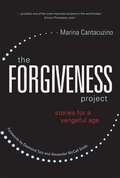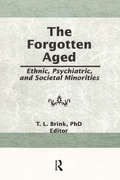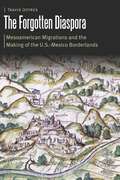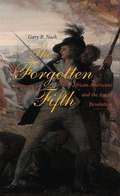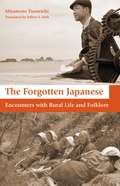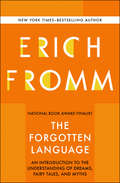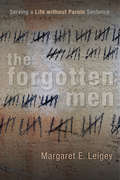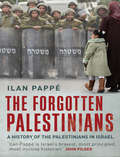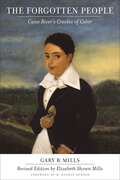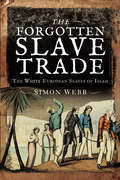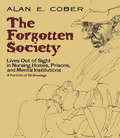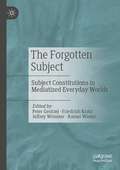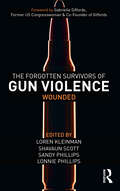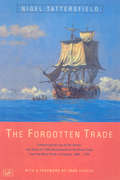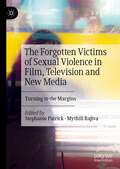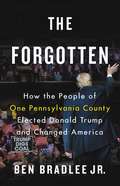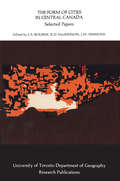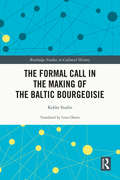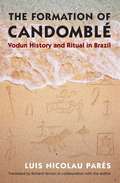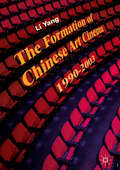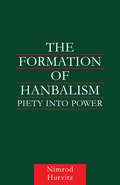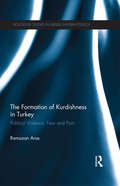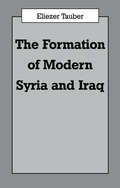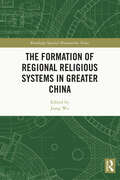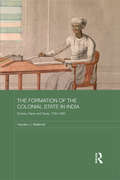- Table View
- List View
The Forgiveness Project: Stories for a Vengeful Age
by Alexander Mccall Smith Marina Cantacuzino Archbishop Emeritus Desmond TutuWhat is forgiveness? Are some acts unforgivable? Can forgiveness take the place of revenge? Powerful real-life stories from survivors and perpetrators of crime and violence reveal the true impact of forgiveness on ordinary people worldwide. Exploring forgiveness as an alternative to resentment or retaliation, the storytellers give an honest, moving account of their experiences and what part forgiveness has played in their lives. Despite extreme circumstances, their stories open the door to a society without revenge. All royalties from the sale of this book go to The Forgiveness Project charity.
The Forgotten Aged: Ethnic, Psychiatric, and Societal Minorities
by T.L. BrinkThis helpful book explores mental health issues relating to elders who do not fit into the “usual” mold for research--white, married or widowed, urban or suburban persons with adult children. The Forgotten Aged focuses on those groups of elders often overlooked in gerontological literature--elder African-Americans, rural aged, gay and lesbian aged, parents of developmentally disabled offspring, older developmentally disabled persons themselves, and “orphan” elders (those who do not have close family members who can serve as caretakers). The book offers “how to” advice on issues such as outreach, intervention, residential placement and transition, assessment, psychotherapy, and team building to help readers learn effective ways of helping elderly persons from these various groups. With an optimistic tone, it explores how more attention and resources, combined with flexible modifications of programs and practices, can yield favorable results for everyone involved. In The Forgotten Aged, authors examine a variety of pertinent topics including: assessment of dementia and depression in African-Americans multidisciplinary team outreach to elderly living in rural areas therapeutic issues with gay and lesbian aged residential transitions for developmentally disabled elderly helping aging parents of developmentally disabled offspring intervention with “orphan” elderly with Alzheimer’s diseaseSocial workers, psychologists, psychiatrists, geriatricians, nurses, and counselors involved in providing support and care for elderly persons will find The Forgotten Aged a useful guide in their daily work and decisionmaking. This book can also serve as an enlightening supplementary text in courses that study aging and the elderly.
The Forgotten Diaspora: Mesoamerican Migrations and the Making of the U.S.-Mexico Borderlands (Borderlands and Transcultural Studies)
by Travis JeffresIn The Forgotten Diaspora Travis Jeffres explores how Native Mexicans involved in the conquest of the Greater Southwest pursued hidden agendas, deploying a covert agency that enabled them to reconstruct Indigenous communities and retain key components of their identities even as they were technically allied with and subordinate to Spaniards. Resisting, modifying, and even flatly ignoring Spanish directives, Indigenous Mexicans in diaspora co-created the U.S.-Mexico borderlands and laid enduring claims to the region. Jeffres contends that tens of thousands—perhaps hundreds of thousands—of central Mexican Natives were indispensable to Spanish colonial expansion in the Greater Southwest in the sixteenth and seventeenth centuries. These vital allies populated frontier settlements, assisted in converting local Indians to Christianity, and provided essential labor in the mining industry that drove frontier expansion and catapulted Spain to global hegemony. However, Nahuatl records reveal that Indigenous migrants were no mere auxiliaries to European colonial causes; they also subverted imperial aims and pursued their own agendas, wresting lands, privileges, and even rights to self-rule from the Spanish Crown. Via Nahuatl-language &“hidden transcripts&” of Native allies&’ motivations and agendas, The Forgotten Diaspora reimagines this critical yet neglected component of the hemispheric colonial-era scattering of the Americas&’ Indigenous peoples.
The Forgotten Fifth: African Americans in the Age of Revolution
by Gary NashAs the United States gained independence, a full fifth of the country's population was African American. The experiences of these men and women have been largely ignored in the accounts of the colonies' glorious quest for freedom. In this compact volume, Gary B. Nash reorients our understanding of early America, and reveals the perilous choices of the founding fathers that shaped the nation's future. <p><p> Nash tells of revolutionary fervor arousing a struggle for freedom that spiraled into the largest slave rebellion in American history, as blacks fled servitude to fight for the British, who promised freedom in exchange for military service. The Revolutionary Army never matched the British offer, and most histories of the period have ignored this remarkable story. The conventional wisdom says that abolition was impossible in the fragile new republic. Nash, however, argues that an unusual convergence of factors immediately after the war created a unique opportunity to dismantle slavery. The founding fathers' failure to commit to freedom led to the waning of abolitionism just as it had reached its peak. In the opening decades of the nineteenth century, as Nash demonstrates, their decision enabled the ideology of white supremacy to take root, and with it the beginnings of an irreparable national fissure. The moral failure of the Revolution was paid for in the 1860s with the lives of the 600,000 Americans killed in the Civil War. <p> The Forgotten Fifth is a powerful story of the nation's multiple, and painful, paths to freedom.
The Forgotten Japanese
by Jeffrey Irish Tsuneichi MiyamotoTsuneichi Miyamoto (1907-1981), a leading Japanese folklore scholar and rural advocate, walked 160,000 kilometers to conduct interviews and capture a dying way of life. This collection of photos, vignettes, and life stories from pre- and postwar rural Japan is the first English translation of his modern Japanese classic. From blowfish to landslides, Miyamoto's stories come to life in Jeffrey Irish's fluid translation.
The Forgotten Language: An Introduction to the Understanding of Dreams, Fairy Tales, and Myths
by Erich FrommRenowned psychoanalyst Erich Fromm investigates the universal language of symbols, expressed through dream and myths, and how it illuminates our humanity. In this study, Erich Fromm opens up the world of symbolic language, &“the one foreign language that each of us must learn.&” Understanding symbols, he posits, helps us reach the hidden layers of our individual personalities, as well as connect with our common human experiences. By grasping the symbolic language of dreams, Fromm explains, we can then also understand the deeper wisdom of myths, art, and literature. This also gives us access to what we, and our society, usually repress. Fromm shares the history of dream interpretations, and demonstrates his analysis of many types of dreams. This ebook features an illustrated biography of Erich Fromm including rare images and never-before-seen documents from the author&’s estate.
The Forgotten Men
by Margaret E. LeigeyToday there are approximately fifty thousand prisoners in American prisons serving life without parole, having been found guilty of crimes ranging from murder and rape to burglary, carjacking, and drug offences. In The Forgotten Men, criminologist Margaret E. Leigey provides an insightful account of a group of aging inmates imprisoned for at least twenty years, with virtually no chance of release. These men make up one of the most marginalized segments of the contemporary U.S. prison population. Considered too dangerous for rehabilitation, ignored by prison administrators, and overlooked by courts disinclined to review such sentences, these prisoners grow increasingly cut off from family and the outside world. Drawing on in-depth interviews with twenty-five such prisoners, Leigey gives voice to these extremely marginalized inmates and offers a look at how they struggle to cope. She reveals, for instance, that the men believe that permanent incarceration is as inhumane as capital punishment, calling life without parole "the hard death penalty." Indeed, after serving two decades in prison, some wished that they had received the death penalty instead. Leigey also recounts the ways in which the prisoners attempt to construct meaningful lives inside the bleak environment where they will almost certainly live out their lives. Every state in the union (except Alaska) has the life-without-parole sentencing option, despite its controversial nature and its staggering cost to the taxpayer. The Forgotten Men provides a much-needed analysis of the policies behind life-without-parole sentencing, arguing that such sentences are overused and lead to serious financial and ethical dilemmas.
The Forgotten Palestinians: A History of the Palestinians in Israel
by Ilan PappéFor more than 60 years, hundreds of thousands of Palestinians have lived as Israeli citizens within the borders of the nation formed at the end of the 1948 conflict. Occupying a precarious middle ground between the Jewish citizens of Israel and the dispossessed Palestinians of the West Bank and the Gaza Strip, the Israeli Palestinians have developed an exceedingly complex relationship with the land they call home; however, in the innumerable discussions of the Israel-Palestine problem, their experiences are often overlooked and forgotten. In this book, historian Ilan Pappé examines how Israeli Palestinians have fared under Jewish rule and what their lives tell us about both Israel's attitude toward minorities and Palestinians' attitudes toward the Jewish state. Drawing upon significant archival and interview material, Pappé analyzes the Israeli state's policy towards its Palestinian citizens, finding discrimination in matters of housing, education, and civil rights. Rigorously researched yet highly readable, The Forgotten Palestinians brings a new and much-needed perspective to the Israel-Palestine debate.
The Forgotten People: Cane River's Creoles of Color (Library of Southern Civilization)
by Gary B. Mills Elizabeth Shown Mills H. Sophie BurtonOut of colonial Natchitoches, in northwestern Louisiana, emerged a sophisticated and affluent community founded by a family of freed slaves. Their plantations eventually encompassed 18,000 fertile acres, which they tilled alongside hundreds of their own bondsmen. Furnishings of quality and taste graced their homes, and private tutors educated their children. Cultured, deeply religious, and highly capable, Cane River's Creoles of color enjoyed economic privileges but led politically constricted lives. Like their white neighbors, they publicly supported the Confederacy and suffered the same depredations of war and political and social uncertainties of Reconstruction. Unlike white Creoles, however, they did not recover amid cycles of Redeemer and Jim Crow politics.First published in 1977, The Forgotten People offers a socioeconomic history of this widely publicized but also highly romanticized community -- a minority group that fit no stereotypes, refused all outside labels, and still struggles to explain its identity in a world mystified by Creolism.Now revised and significantly expanded, this time-honored work revisits Cane River's "forgotten people" and incorporates new findings and insight gleaned across thirty-five years of further research. This new edition provides a nuanced portrayal of the lives of Creole slaves and the roles allowed to freed people of color, tackling issues of race, gender, and slave holding by former slaves. The Forgotten People corrects misassumptions about the origin of key properties in the Cane River National Heritage Area and demonstrates how historians reconstruct the lives of the enslaved, the impoverished, and the disenfranchised.
The Forgotten Slave Trade: The White European Slaves of Islam
by Simon Webb“A solid introduction and useful survey of slaving activity by the Muslims of North Africa over the course of several centuries.” —ChroniclesEverybody knows about the transatlantic slave trade, which saw black Africans snatched from their homes, taken across the Atlantic Ocean and then sold into slavery. However, a century before Britain became involved in this terrible business, whole villages and towns in England, Ireland, Italy, Spain and other European countries were being depopulated by slavers, who transported the men, women and children to Africa where they were sold to the highest bidder. This is the forgotten slave trade; one which saw over a million Christians forced into captivity in the Muslim world.Starting with the practice of slavery in the ancient world, Simon Webb traces the history of slavery in Europe, showing that the numbers involved were vast and that the victims were often treated far more cruelly than black slaves in America and the Caribbean. Castration, used very occasionally against black slaves taken across the Atlantic, was routinely carried out on an industrial scale on European boys who were exported to Africa and the Middle East. Most people are aware that the English city of Bristol was a major center for the transatlantic slave trade in the eighteenth century, but hardly anyone knows that 1,000 years earlier it had been an important staging-post for the transfer of English slaves to Africa.Reading this book will forever change how you view the slave trade and show that many commonly held beliefs about this controversial subject are almost wholly inaccurate and mistaken.
The Forgotten Society: A Portfolio of 92 Drawings
by Alan E. Cober Leslie Cober-GentryA prominent artist ventured behind locked doors to portray three "forgotten" social classes. Alan E. Cober encountered his subjects in retirement homes as well as such notorious institutions as Willowbrook State School and Sing Sing Correctional Facility. His 92 expressive portraits of social outsiders recall the traditions of Albrecht Dürer and George Grosz.
The Forgotten Subject: Subject Constitutions in Mediatized Everyday Worlds
by Jeffrey Wimmer Friedrich Krotz Rainer Winter Peter GentzelThe volume provides a critical inventory of existing concepts of the subject in communication studies research. In addition, concepts are developed in order to be able to analyze subjectivity in the context of current theoretical debates (including media sociology, cultural studies, psychoanalysis, practice theory, science and technology studies) as well as social, cultural and technical developments (including digitalization, mediatization, mobility and networking). Since subject conceptions are of central importance for any communication and media analyses, the volume fills a central gap in communication and media studies.
The Forgotten Survivors of Gun Violence: Wounded
by Loren Kleinman Shavaun Scott Sandy Phillips Lonnie PhillipsThe toll of America’s gun violence epidemic is usually measured in lives lost—more than 35,000 each year. Ignored, almost completely, are the many more people who are shot every year, and survive. —Shot and Forgotten, The Trace “Nearly 40,000 people die from gun violence in the US every year. This uniquely American crisis leaves no community untouched—but it doesn’t have to be this way.” —Gabrielle Giffords The Forgotten Survivors of Gun Violence collects 20 personal essays of survivors’ visible and invisible wounds from school shootings, attempted suicide by firearm, mass shootings, gang violence, and domestic violence. Their stories remind us that these traumatic experiences are not exclusive to combat soldiers but, more notably, suffered by ordinary people during modern life. With this collection, editors Loren Kleinman, Shavaun Scott, Sandy Phillips and Lonnie Phillips expose the true lifecycle of a bullet and the trauma left in its wake. Through personal narratives and select personal photos, the wounded tell a story that’s forgotten when the cameras go away. This collection will be of interest to first responders, officers, therapists, medical practitioners, and educators.
The Forgotten Trade: Comprising the Log of the Daniel and Henry of 1700 and Accounts of the Slave Trade From the Minor Ports of England 1698-1725
by Nigel Tattersfield`I pray people will read this richly detailed and absorbing book, with its vivid renaissance of a matter most of us English seem to have wished into oblivion. ' John Fowles Meticulously kept by Walter Prideaux, the log of the Daniel and Henry provides an astonishing record of a trading venture in the year 1700. Two years earlier, the Guinea trade had been prised loose by an Act of Parliament from the monopoly of the Royal African Company, and respectable burghers in a dozen small provincial ports seized what they saw as an opportunity for quick rewards from the slave trade. Few of these merchants knew anything of trading in Africa, nor of the unscrupulous tribalchiefs who readily offered men, women and children in hard bargaining for beads, alcohol, weapons and gunpowder. In the second part of this book, Tattersfield went in search of long-forgotten documents to chart how small provincial ports fared both economically and morally in the early years of slave trading.
The Forgotten Victims of Sexual Violence in Film, Television and New Media: Turning to the Margins
by Stephanie Patrick Mythili RajivaThis edited collection provides an intersectional and transnational exploration of representations of sexual violence and rape within films, television shows, and digital media in the contemporary context of the #MeToo and #TimesUp movements. Drawing upon sociology, gender studies, cultural studies, media studies, and Black feminist studies, chapters focus on women and texts at the margins of mainstream culture’s depictions of sexual violence. The editors and contributors examine the dominant narrative of the thin, cisgender, heterosexual white female victim, and the ways in which social and cultural conversations around race and gender impact and are impacted by depictions of sexual violence in media. This book will be of interest to scholars and students in sociology, gender studies, and media studies, particularly those interested in the intersectionality of race and gender.Chapter 1 is available open access under a Creative Commons Attribution 4.0 International License via link.springer.com.
The Forgotten: How the People of One Pennsylvania County Elected Donald Trump and Changed America (A\book Of The Holy Roman Empire Ser.)
by Ben BradleeThe people of Luzerne County, Pennsylvania voted Democratic for decades, until Donald Trump flipped it in 2016. What happened?Named one of the "juiciest political books to come in 2018" by Entertainment Weekly.In The Forgotten, Ben Bradlee Jr. reports on how voters in Luzerne County, a pivotal county in a crucial swing state, came to feel like strangers in their own land - marginalized by flat or falling wages, rapid demographic change, and a liberal culture that mocks their faith and patriotism.Fundamentally rural and struggling with changing demographics and limited opportunity, Luzerne County can be seen as a microcosm of the nation. In The Forgotten, Trump voters speak for themselves, explaining how they felt others were 'cutting in line' and that the federal government was taking too much money from the employed and giving it to the idle. The loss of breadwinner status, and more importantly, the loss of dignity, primed them for a candidate like Donald Trump. The political facts of a divided America are stark, but the stories of the men, women and families in The Forgotten offer a kaleidoscopic and fascinating portrait of the complex on-the-ground political reality of America today.
The Form of Cities in Central Canada
by L. S. Bourne Ross D. Mackinnon James W. SimmonsDo Canadian cities have a distinctive form? How has this form evolved over time; and what has been the impact of growth, transportation changes and differing lifestyles on the contemporary Canadian urban environment? The research summarized in the present volume is directed at these kinds of questions. This book is an anthology of research papers and reports building around a common theme: urban development in Central Canada. Within this context, specific interests focus on the spatial structure of the city, land use distributions, patterns of population density and intercity migration, networks of interaction, communities, and lives. This collection of papers will be of interest as a general reference which is not just descriptive, but one which includes a range of examples of analytical approaches. As such it is also designed as a contribution to the growing literature on urban research and policy formulation in Canada.(University of Toronto Department of Geography Research Publications 12)
The Formal Call in the Making of the Baltic Bourgeoisie (Routledge Studies in Cultural History)
by Kekke StadinThis book studies the making of the bourgeoisie the Baltic Sea region in the nineteenth Century. This region was peripheral in comparison to England and France, with respect to urbanization, economic development, liberalism, and consumption. The bourgeoisie was still a class-to-be. By the end of the Century the bourgeoisie was a self-aware class incorporated in the European bourgeoisie. Their life style was mostly the same as in Western Europe, but there were also some cultural differences. The author argues that in the Baltic Sea area, this life style was shaped by both women and men. Thus, the study deals with the heterosocial life in private homes. Society life became an important instrument for defining and controlling the new social boundaries. This was also where, through the encounters among like-minded people, values and norms were tested, negotiated, and honed. This is studied in the context of the new ideals and morals connected to the bourgeoisie: a bourgeois work ethic based on industriousness and hard work, and the quiet family life of the home. The focus is on the calls, the hub around which society life was formed. No social interaction in the home was possible without morning calls.
The Formation of Candomblé
by Luis Nicolau ParésInterweaving three centuries of transatlantic religious and social history with historical and present-day ethnography, Luis Nicolau Pares traces the formation of Candomble, one of the most influential African-derived religious forms in the African diaspora, with practitioners today centered in Brazil but also living in Europe and elsewhere in the Americas. Originally published in Brazil and not available in English, The Formation of Candomble reveals cultural changes that have occurred in religious practices within Africa, as well as those caused by the displacement of enslaved Africans in the Americas. Departing from the common assumption that Candomble originated in the Yoruba orixa (orisha) worship, Pares highlights the critical role of the vodun religious practices in its formation process. Vodun traditions were brought by enslaved Africans of Dahomean origin, known as the "Jeje" nation in Brazil since the early eighteenth century. The book concludes with Pares's account of present-day Jeje temples in Bahia, which serves as the first written record of the oral traditions and ritual of this particular nation of Candomble.
The Formation of Chinese Art Cinema: 1990-2003
by Li YangThe Formation of Chinese Art Cinema: 1990–2003 examines the development of Chinese art film in the People’s Republic of China from 1990, when the first Sixth Generation film Mama was released, to 2003, when authorities acknowledged the legitimacy of underground filmmakers. Through an exploration of the production and consecration mechanisms of the new art wave and its representative styles, this book argues that the art wave of the 1990s fundamentally defined Chinese art cinema. In particular, this vital art wave was not enabled by democratic liberalism, but by the specific industrial development, in which the film system transitioned from Socialist propaganda into a commercialized entity. Allowing Chinese art film to grow but at the same time denying its legitimacy, this paradoxical transition process shaped Chinese art film’s institutional and aesthetical alternative positioning, which eventually helped consolidate the art wave into art cinema. Ultimately, this book is a history of the Chinese portion of global art cinema, which also reveals the complex Chinese cultural experiences during the Reform Era.
The Formation of Hanbalism: Piety into Power (Culture And Civilization In The Middle East Ser.)
by Nimrod HurvitzAhmad Ibn Hanbal (d. 855) was the eponymous founder of a school of law, and an influential intellectual who led the Baghdadi masses during the Inquisition. Owing to his status as a jurist, to the religious ideas he propounded and to his model way of life, he is perceived as one of the pivotal figures in the history of Islam and a revered hero to th
The Formation of Kurdishness in Turkey: Political Violence, Fear and Pain (Routledge Studies in Middle Eastern Politics)
by Ramazan ArasThe Formation of Kurdishness in Turkey examines political violence, the politics of fear and the Kurdish experience of pain through an analysis of life stories, personal narratives and testimonies of Kurdish subjects in contemporary Turkey. It traces the physical and psychological impacts of the war between the state security forces and the PKK (Kurdistan Workers’ Party) guerrillas in the last three decades, in Kurdish populated areas in the south-eastern part of Turkey. Focusing on the instrumentalization of violence, the ensuing and manufactured culture of fear, gendered experiences of state violence, pain, incarceration, and corporeal punishment, Ramazan Aras argues that these phenomena have shaped contemporary Kurdish history and memory. Analysing occurrences of various forms of protracted state violence and fear not only as personal and differential markers experienced by individuals, but also as communally-felt phenomena which have engendered collective suffering, this book asserts that these traumatic experiences have marked the social body and produced a prevailing narrative of Kurdishness. Providing an anthropological study of political violence, fear, and pain amongst the Kurdish community in Turkey, this book will be welcomed by students and scholars of Kurdish Studies, Middle East Studies and Anthropology.
The Formation of Modern Iraq and Syria
by Eliezer TauberThis volume examines the impact of clandestine and overt political organizations in Syria, Lebanon, Palestine and Iraq after World War I. It analyzes Amir Faysal's short-lived state in post-war Syria, relations between Syrians, Iraqis and Palestinians, and nationalist activity within Iraq.
The Formation of Regional Religious Systems in Greater China (Routledge Spatial Humanities Series)
by Jiang WuThe rise of Spatial Humanities has spurred a digital revolution in the field of Chinese studies, especially in the study of religion. Based on years of data compilation and analysis of religious sites, this book explores the formation of Regional Religious Systems (RRS) in Greater China in unprecedented scope and depth. It addresses quantitatively the enduring historical and contemporary issues of China’s deep-rooted regionalism and spatially variegated cultural and religious landscape. A range of topics are explored: theoretical discussions of the concept of RRS; case studies of regional and local religious institutions; the formation of local cults and pilgrimage network; and the spread of religious networks to overseas Chinese communities and the Bon religion in Tibet. The book also considers long-standing challenges of researching with spatial data for humanities and social science research, such as data collection, integration, spatial analysis, and map creation. This book will be of interest to students and scholars in Religious Studies, Cultural Studies, Chinese Studies, Digital Humanities, Human Geography and Sociology.
The Formation of the Colonial State in India: Scribes, Paper and Taxes, 1760-1860 (Routledge Studies in South Asian History)
by Hayden J. BellenoitIn the period between the 1770s and 1840s, through the process of colonial state formation, the early colonial state in India was able to harness and extract vast amounts of agrarian wealth in north India. However, little is known of the histories of the Indian scribes and the role they played in shaping the early patterns of British colonial rule.This book offers a new way of interpreting the colonial state’s origins in north India. It examines how the formation of early agrarian revenue settlements exacerbated an extant late Mughal taxation tradition, and how the success of British power was shaped by this extant paper-oriented revenue culture. It goes on to examine how the service and cultural histories of various Hindu scribal communities fit within broader changes in political administration, taxation, patterns of governance and a shared Indo-Islamic administrative culture. The author argues that British power after the late eighteenth century came as much through bureaucratic mastery, paper and taxes as it did through military force and commercial ruthlessness. The book draws upon private family papers, interviews and Persian sources to demonstrate how the fortunes of scribes changed between empires, and the important role they played at the height of the British Raj by 1900.Offering a detailed account of how agrarian wealth provided the bedrock of the colonial state’s later patterns of administration, this book is a unique and refreshing contribution to studies in South Asian History, Governance and Imperialism.
